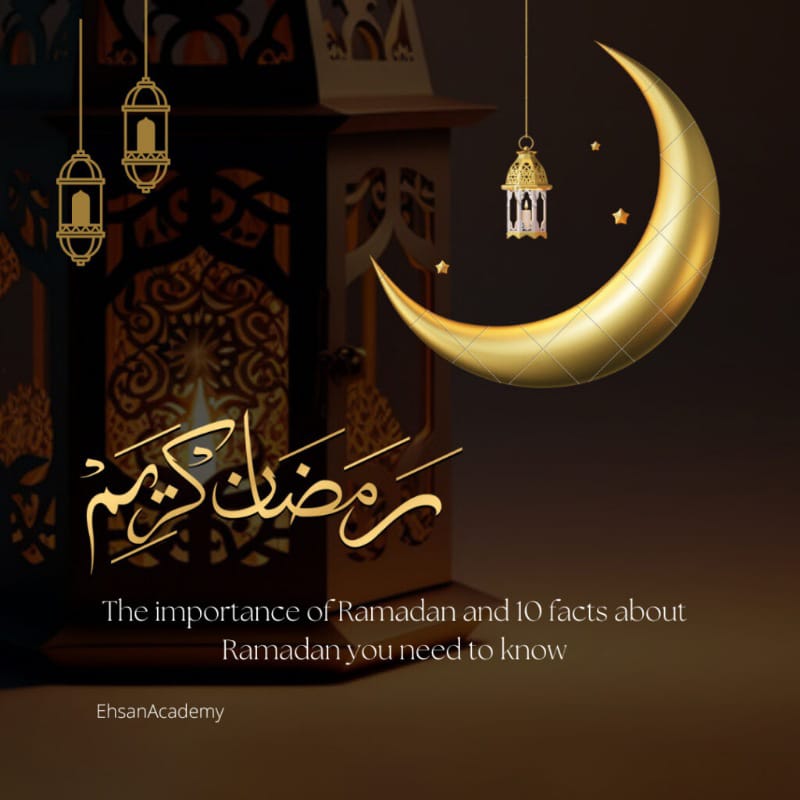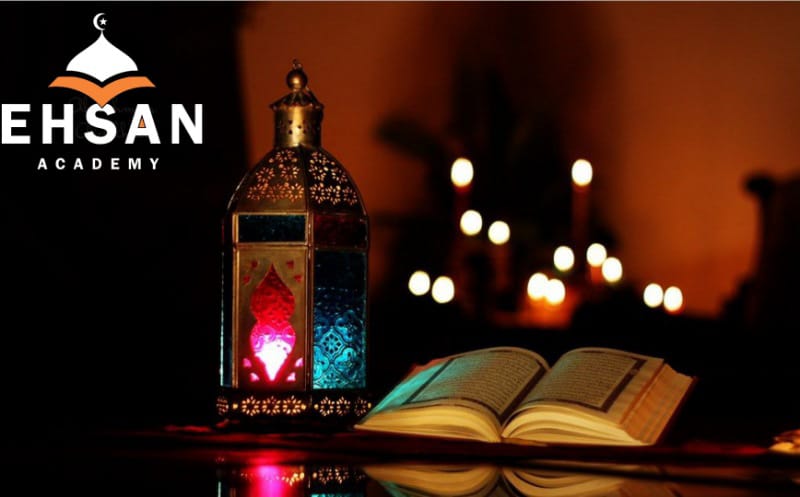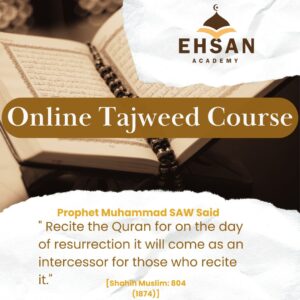As the moon’s crescent shines so bright,
A blessed month emerges in sight,
Ramadan, a time of pure delight,
A chance to worship with all our might,
To cleanse our souls and make them white,
And seek Allah’s mercy day and night
Ramadan is a month that the Muslim world eagerly looks forward to every year. It is a gifted chance from Allah- a chance to be forgiven for the sins we have committed all year round.
Due to the importance of Ramadan; we are to put aside all the things that distract us from Allah. We are to put our trust in Allah and gain the sense that Allah is always with us. Muslims focus on their prayers in Ramadan more than any other month of the year.
And that breeds the question; what exactly is the importance of Ramadan or what are the 10 facts about Ramadan that make it so significant?
Table of Contents
- 1 Importance of Ramadan and 10 facts about Ramadan
- 2 1- Ramadan is the month of revelation
- 3 2- Fasting: the fourth pillar of Islam
- 4 3- The Night of Power (Laylat al-Qadr)
- 5 4- Gates of Hell are closed during Ramadan
- 6 5- Umra’h in Ramadan is equivalent to Hajj
- 7 6- I’tikaaf
- 8 7- Blessings of Suhoor and Iftar in Ramadan
- 9 8- Eid al-Fitr
- 10 9- The reward for every deed increases
- 11 10- Taraweeh prayer in Ramadan
- 12 Donate and invest in Ramadan
- 13 FAQs
- 13.1 How to complete Quran in Ramadan
- 13.2 What is Ramadan and why is it important?
- 13.3 What are some key facts about Ramadan?
- 13.4 What is fasting during Ramadan and why is it important?
- 13.5 What is the Night of Power (Laylat al-Qadr)?
- 13.6 What is Zakat and why is it important?
- 13.7 What is Tarawih prayer and why is it important?
- 13.8 Why is it important to understand the practices and significance of Ramadan?
Importance of Ramadan and 10 facts about Ramadan
1- Ramadan is the month of revelation
Ramadan is the month of mercy. It is the month of revelation and the month of the Holy Quran.
The first verse of the Holy Quran was revealed in Ramadan as a great guide for all human beings, with the apparent proof for humans to differentiate between right and wrong.
Ramadan is called the month of the Quran because it is the month when Allah showered His divine mercy on His people and showed them the ray of light in the darkness of the world and blessed us with the powerful book of the world and the heaven that have the power to change the life, the destination and the end of us.
Because it is the Book of the world’s creator. The Almighty Allah and none others.
Ramaḍân is the month in which the Quran was revealed as a guide for humanity with clear proofs of guidance and the standard ˹to distinguish between right and wrong˺.
(Al Quran Surah Al-Baqarah, verse 185)
2- Fasting: the fourth pillar of Islam
Islam is the religion of Love. Allah is love and acknowledges the love. The merciful lord has given us the treasurer of Islam and guided us to strengthen our belief with five pillars of Islam, i.e. the oneness of Allah, the establishment of prayer, Zakat, Haj, and sawm.
A building can’t stand without a pillar. If a single pillar of the building gets unstable, the entire building gets destroyed.
The same goes for the belief if any believer follows the four pillars of Islam and neglects the fifth one, the building of the believer’s belief would be in great danger.
Fasting is the fourth pillar of Islam that is made mandatory during Ramadan for every Muslim. This fourth pillar of Islam helps Muslims strengthen their connection with Almighty Allah and recharge their spirituality to perform all good deeds.
It is narrated on the authority of (‘Abdullah) son of Umar (may Allah be pleased with them) that the Prophet (may the peace of Allah be upon him) said:
(The superstructure of) al-Islam is raised on five (pillars), i. e. the oneness of Allah, the establishment of prayer, payment of Zakat, the fast of Ramadan, Pilgrimage (to Mecca). A person said (to ‘Abdullah b. Umar the narrator): Which of the two precedes the other Pilgrimage or the fasts of Ramadan? Upon this, he (the narrator) replied: No (it is not the Pilgrimage first) but the fasts of Ramadan precede the Pilgrimage.
(Sahih Muslim 16a)

3- The Night of Power (Laylat al-Qadr)
The night that is better than 1000 nights comes as one of the greatest blessings of Allah in Ramadan.
The night of power, or Laylat al Qadr, is hidden in the last ten days of Ramadan. Which is better than 1000 nights according to the Hadith.
It means when you perform the prayer, give sadaqah, do dhikr, or perform i’tikaf. You will get rewarded for doing these acts and worshiping Allah for better than 1000 nights.
The ummah of prophet Muhammad (peace be upon him) doesn’t have long lives like other ummahs who used to live for 100s of years. Allah gave us laylatul Qadr to earn the rewards better than worshiping in 1000 nights.
Would you not avail this greatest opportunity?
Narrated `Aisha:
Allah’s Messenger (ﷺ) said, “Search for the Night of Qadr in the odd nights of the last ten days of Ramadan.”
(Sahih al-Bukhari 2017)
4- Gates of Hell are closed during Ramadan
Ramadan comes with infinite mercy and blessings of Allah that don’t have any boundaries. Allah blesses all his servants in the month of mercy and opens the gates of paradise.
Shaitan (devils), the enemy of the believers, is also chained by Allah (SWT) to make Ramadan worships easy for His people.
Isn’t it a great opportunity to earn as many rewards as possible without the evil whisperer of the devil?
Abu Hurairah said; ‘The Messenger of Allah said:
‘When Ramadan begins, the gates of Paradise are opened, the gates of Hell are closed, and the devils are chained up.”
(Sunan an-Nasa’i 2099)
5- Umra’h in Ramadan is equivalent to Hajj
Every Muslim dreams of performing Hajj. Some can’t afford it and some find it difficult to get the time from their busy schedule.
Haj and umrah are the greatest acts of worship. Allah has given us the opportunity to earn the reward of Hajj by performing Umrah in Ramadan.
If Allah has given you His blessings from his treasures and made you capable of performing hajj and umrah every year. Try to find someone that desires to perform pilgrim but can’t afford it. You’ll get the equal reward of performing Umrah/hajj by sending needy people.
Umm Ma’qil narrated that: The Prophet said:
“Umrah during Ramadan is equal to Hajj.”
6- I’tikaaf
Two types of i’tikaf can be done during Ramadan. The sunnah Itikaf and the Nafl Itikaf.
In sunnah i’tikaf, Muslims stay at mosques in the last ten days of Ramadan, devoting themselves to Ibada and staying away from worldly affairs.
While for nafl i’tikaf, you can make niyat (intention) whenever you are going to pray salat, recite Quran, or do dhikr to earn the reward of Nafl I’tikaf while doing other worship.
Both Itikafs are precious blessings of Ramadan and highlight the importance of Ramadan.
7- Blessings of Suhoor and Iftar in Ramadan
Ramadan comes with the excitement for suhoor and family gathering in Iftar. Indeed, Suhoor and iftar are great blessings of Allah.
In suhoor, believers are guided to eat to get prepared for the fast, as there is a blessing in suhoor. While in iftar believers break fast and make dua to Allah, to accept their fast.
Don’t forget needy and poor people. Ramadan is a month of love, spread love, and work for providing iftar and suhoor people to all the Muslims around you.
It was narrated from Abu Hurairah that the Prophet said:
“Take Sahur, for in Sahur there is a blessing.”
(Sunan an-Nasa’i 2149)
8- Eid al-Fitr
Eid Al fitr comes with the sadness of bidding farewell to Ramadan and the happiness of receiving the blessings of Allah in the form of Eid Al Fitr. Eid Al fitr is celebrated on sighting the moon of the Shawwal, the tenth month of the lunar calendar.
Eid Al Fitr is one the greatest reward of Allah for the people that keep fast for Allah for the whole month of Ramadan and practice the teaching of the Sunnah and the Quran.
Do you love eid al fitr?
Enjoy eid al fitr to the fullest, but do remember other needy people in your happiness. You may hold the capability to buy your best eid dresses but everyone doesn’t. Be grateful to Allah that he had made you complete Ramadan fast and for whatever happiness you celebrate with your family in Eid Al fitr.
9- The reward for every deed increases
Allah, the Exalted and Majestic, the merciful, have showered his immense blessing upon us and made us one of the blessed people that were able to reach this month and have made us realize its importance.
Spend each moment of this month wisely, because no one knows that it can be the last Ramadan for one of us.
His mercy has no boundaries. He has promised to multiply each of our rewards in the Holy month of Ramadan. Ramadan comes for a month but brings many opportunities for us to achieve Allah’s pleasure, His mercy, His forgiveness, and unlimited reward for the hereafter.
Abu Huraira (Allah be pleased with him) reported Allah’s Messenger (ﷺ) as saying:
Every (good) deed of the son of Adam would be multiplied, a good deed receiving a tenfold to seven hundredfold rewards. Allah, the Exalted and Majestic, has said: With the exception of fasting, for it is done for Me and I will give a reward for it, for one abandons his passion and food for My sake. There are two occasions of joy for one who fasts, joy when he breaks it, and joy when he meets his Lord, and the breath (of an observer of fast) is sweeter to Allah than the fragrance of musk.
(Sahih Muslim 1151e)
10- Taraweeh prayer in Ramadan
Taraweeh is the sunnah prayer that is offered every night after the isha prayer. It is a medium for strengthening spiritual power and getting connected with Allah. Whoever offers taraweeh comes under the mercy of Allah.
Taraweeh Dua and Taraweeh prayer hold great importance in Ramadan. If you want to read more about How taraweeh is performed and what is the significance of performing Taraweeh and its dua, read our article on Taraweeh prayer and Dua of Taraweeh.
How to spend your day in Ramadan
Ramadan is precious for you only if you spend it the right way. Here is a short guideline on how to spend your day in Ramadan and make it your best Ramadan ever.
Fast and do it with your entire body in Ramadan
Fasting is not about staying hungry or thirsty. Allah doesn’t put the burden on His people, but for their betterment. Self-realization, patience, and spiritual power are the soul of fasting.
يَـٰٓأَيُّهَا ٱلَّذِينَ ءَامَنُوا۟ كُتِبَ عَلَيْكُمُ ٱلصِّيَامُ كَمَا كُتِبَ عَلَى ٱلَّذِينَ مِن قَبْلِكُمْ لَعَلَّكُمْ تَتَّقُونَ
O you who have believed, decreed upon you is fasting as it was decreed upon those before you that you may become righteous–(Al-Quran 2:183)
In the Holy Quran, Allah has mentioned صِّيَامُ in different verses. Which means to fast with the entire body.
Fasting with the entire body means refraining from eating and drinking won’t benefit us until we fast by heart, hand, tongue, eyes, and every part of our body. Siyam is made obligatory for every Muslim. It means avoiding zina, backbiting, lying, fighting, anger, and everything that Allah has condemned while fasting.
It was narrated from Abu Hurairah that the Messenger of Allah (PBUH) said:
‘Whoever does not give up evil and ignorant speech, and acting in accordance with that, Allah has no need of his giving up his food and drink.”
(Sunan Ibn Majah 1689)
Get the most out of 10 days of Ramadan- I’tikaf
Itikaf is the great blessing of Allah in Ramadan that gives you the chance to get out of the worldly depression and worldly affairs for 10 days and devote yourself to Allah.
Perform i’tikaf and spend time with Allah. It is a beautiful sunnah of Prophet Muhammad (peace be upon Him).
There is a substantial reward for performing sunnah i’tikaf in Ramadan.
Will you not hold all your work for 10 days to get close to Allah?
Spend the night of Lailat Al-Qadr in prayer
“Abu Hurairah narrated that:
The Messenger of Allah [SAW] said: “Whoever stands (in the voluntary night prayer of) Ramadan out of faith and in the hope of reward, his previous sins will be forgiven. And whoever spends the night of Lailat Al-Qadr in prayer out of faith and in the hope of reward, his previous sins will be forgiven.”
(Sunan an-Nasa’i 5027)
Donate and invest in Ramadan
According to the Hadith, charity done in Ramadan is the best charity. Give zakat and sadaqah in Ramadan. Donate to needy people. Allah is a giver. He does not take things but grants us from his treasure.
Whenever you donate money to His people, give zakat or sadaqah, you are giving it to Allah and He gives it back to you after multiplying it several times.
You are blessed that you are not among the ones that need zakat or sadaqah. Your hand is open for giving charity to Allah’s people and not the other way around.
Be grateful to Allah for this blessing and give some part of your income, be it 1% to the needy people in the form of Sadaqah. Allah will return it back with so much happiness and rewards that it would become hard to contain all of it.
Anas narrated that:
the Prophet was asked which fast was most virtuous after Ramadan? He said: “Sha’ban in honor of Ramadan” He said: “Which charity is best?” He (pbuh) said: “Charity in Ramadan.”
Note: Most of us give sadaqah and zakat, but only a few care about giving pure money to Sayyid families (the descendent of Prophet Muhammad (peace e upon him). We claim that we love him the most, but the fact is none of us take care of Sayyid’s family. Sayyid families can not receive Zakat and Sadaqah. But it’s our responsibility to find the needy Sayyid families and give them a share from our pocket money or pure money.
Connect with Quran during Ramadan
Ramadan is the month of the Holy Quran. Strengthen your connection with the Holy Quran during Ramadan. Read the powerful verses, understand Allah’s messages in the Holy Quran, learn recitation with tajweed, and try to memorize some parts of it.
This book is most beloved by Allah, dedicating your time to this book means dedicating your time to Allah. Set your Quran reading schedule in Ramadan.
Ramadan only comes for a fixed and little number of days. It’s up to you how valuable you make your success in the world and hereafter!
We hope this article has provided you with valuable insights and a better understanding of Ramadan. May we all strive to observe this month with sincerity, faith, and compassion for ourselves and others.
FAQs
How to complete Quran in Ramadan
Read 1 juz after every prayer to complete the entire Quran in Ramadan.
What is Ramadan and why is it important?
A: Ramadan is the ninth month of the Islamic lunar calendar and is considered a holy month by Muslims worldwide. It is important because it is a time of increased devotion, self-discipline, and spiritual growth.
What are some key facts about Ramadan?
A: Some key facts about Ramadan include the dates on which it is observed, the act of fasting, the Night of Power, the celebration of Eid al-Fitr, and the payment of Zakat.
What is fasting during Ramadan and why is it important?
A: Fasting during Ramadan involves abstaining from food, drink, and other physical needs from dawn until sunset. It is important because it is considered an act of worship and a means of attaining spiritual growth and self-discipline.
What is the Night of Power (Laylat al-Qadr)?
A: The Night of Power is a special night during Ramadan that is believed to be one of the most significant nights of the year. It is a time for increased worship and devotion, and it is believed that one’s prayers and good deeds on this night are multiplied.
What is Zakat and why is it important?
A: Zakat is a form of charitable giving and is one of the Five Pillars of Islam. It is important because it is considered an act of worship and a means of attaining spiritual growth. It also plays a crucial role in social justice by ensuring that wealth is distributed fairly and helping to reduce poverty.
What is Tarawih prayer and why is it important?
A: Tarawih prayer is a special prayer that is performed during Ramadan. It is important because it is considered an act of worship and a means of attaining spiritual growth.
Why is it important to understand the practices and significance of Ramadan?
A: Understanding the practices and significance of Ramadan is important because it allows for a deeper appreciation of this holy month and its impact on individuals and communities. It also promotes understanding and respect for different cultures and religions.







